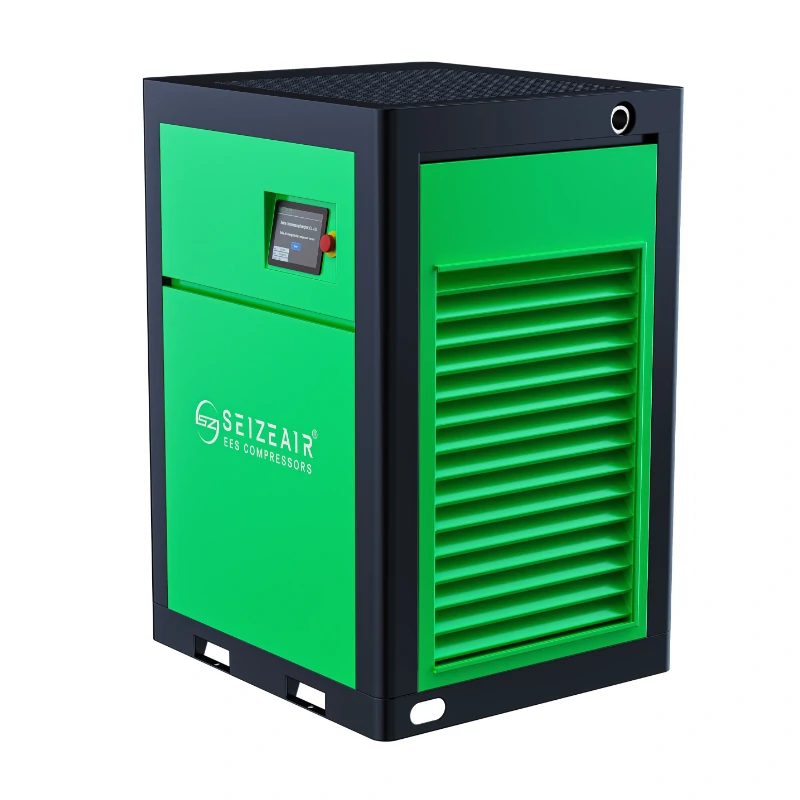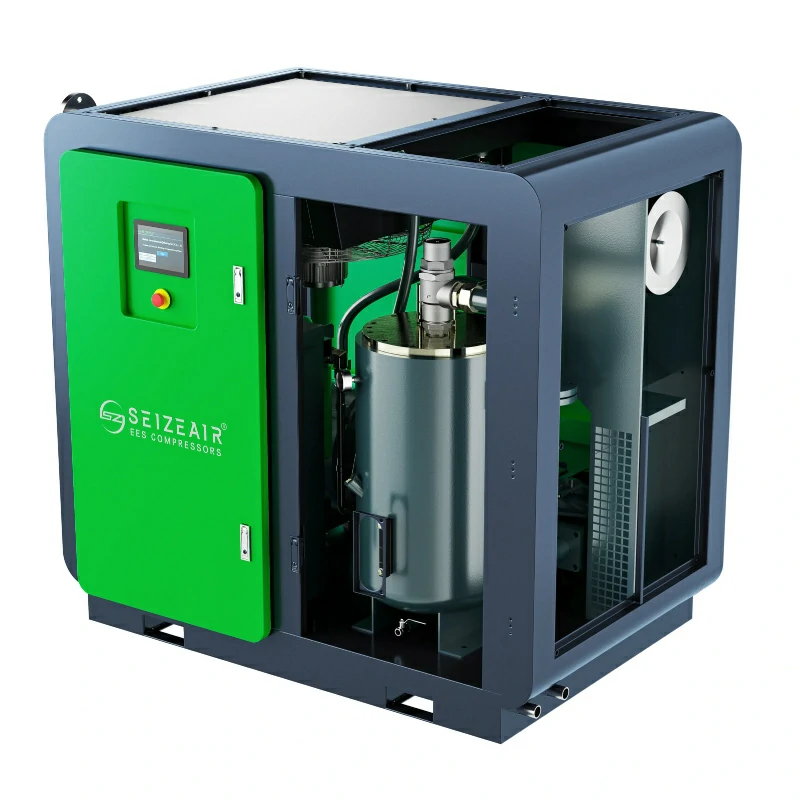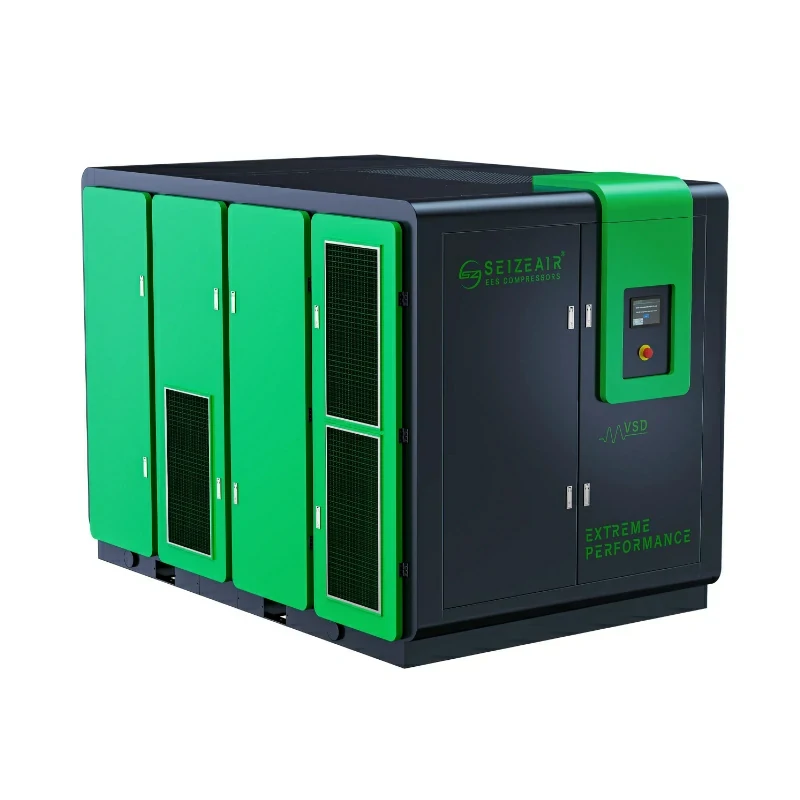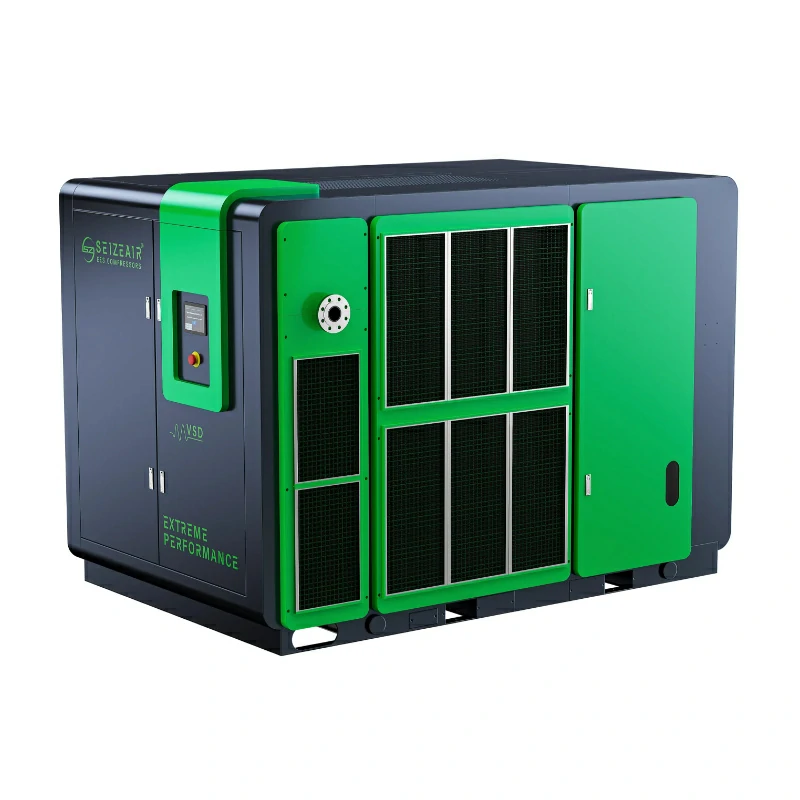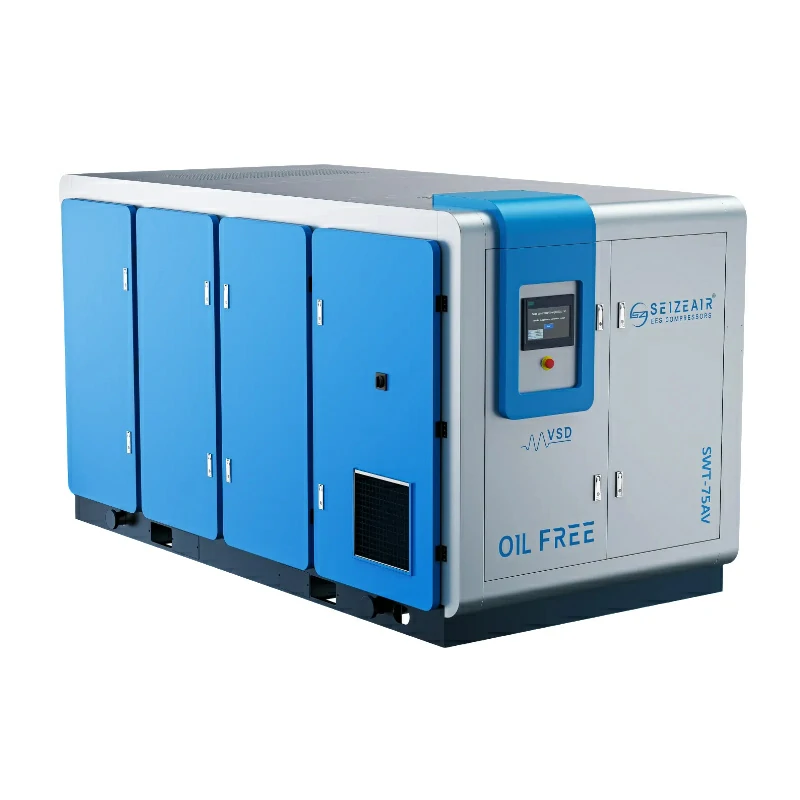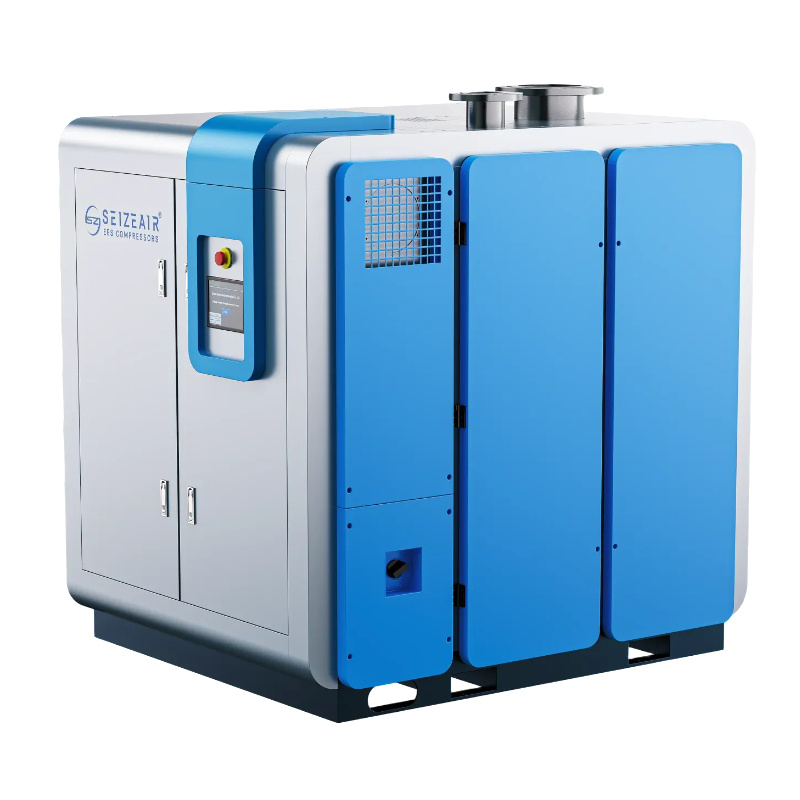Introduction
Compressed air is considered the “fourth major energy source” in modern industry, alongside electricity, water, and natural gas. Used across sectors like manufacturing, mining, food processing, and automotive, air compressors power production equipment and pneumatic tools. However, they are also significant energy consumers, accounting for 20% to 30% of total industrial energy use. As a result, energy-saving air compressors have become crucial for reducing electricity costs and promoting sustainable production.
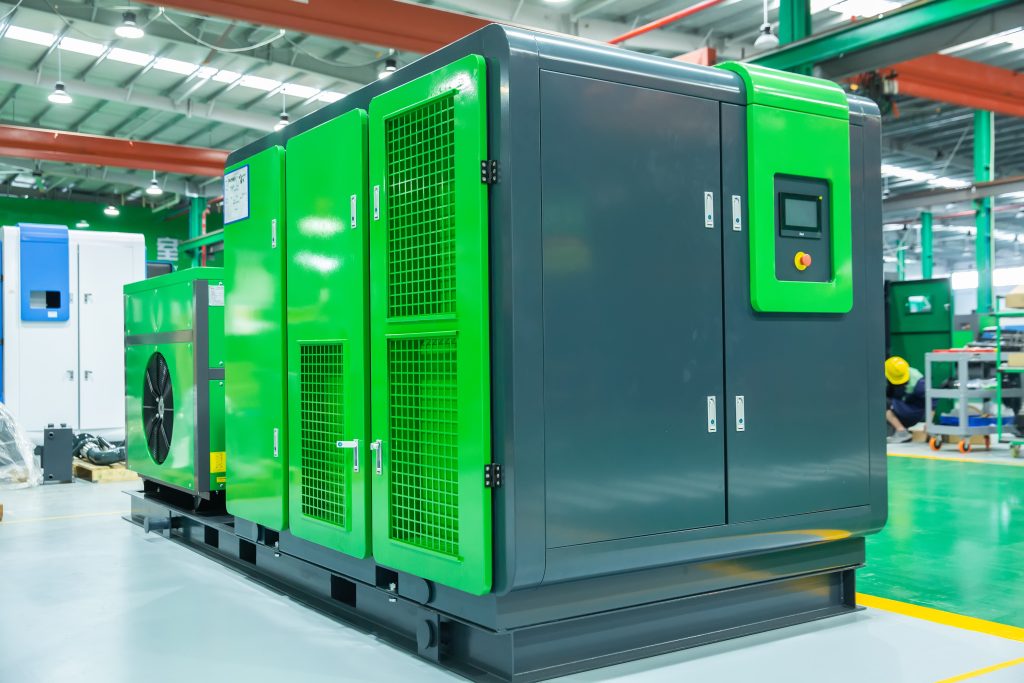
What Are Energy Saving Air Compressors?
Energy saving air compressors optimize the compression process through high-efficiency motor control, intelligent management systems, and advanced aerodynamic design. Unlike traditional fixed-speed compressors, these units automatically adjust operating speeds based on actual air demand, preventing energy waste.
Current mainstream energy savingtechnologies include:
Variable Speed Drive (VSD) Technology
VSD energy saving air compressors automatically adjust motor speed based on air demand, matching output air volume to actual usage and significantly reducing idle time.
Permanent Magnet Synchronous Motor (PM Motor)
Compared to conventional induction motors, PM motors offer higher energy efficiency ratios and lower losses. They maintain high efficiency even during low-load operation, making them a key energy savingtechnology.
Intelligent Control and Monitoring System
Modern energy saving air compressors typically incorporate intelligent control modules that monitor pressure, temperature, and operational status in real time. These systems automatically adjust parameters to maintain optimal efficiency.
Heat Recovery System
Compressor operation generates substantial heat. Energy-efficient units utilize heat recovery systems to convert this energy into hot water or heating resources, enabling secondary energy utilization.
Core Values of Energy Saving Air Compressors
The core value of energy saving air compressors extends beyond mere “energy efficiency.” It represents comprehensive improvements for enterprises in operational efficiency, production reliability, and green sustainable development. Below is a detailed analysis of its core value across four dimensions.
Significantly Reduce Energy Consumption and Operating Costs
In most factories, air compressors are typically the third-largest energy-consuming equipment after motors and heating systems.
Traditional fixed-speed compressors operate at full speed even under low loads, causing severe energy waste. In contrast, energy saving air compressors utilize Variable Speed Drive (VSD) technology and intelligent pressure regulation systems to automatically adjust motor speed based on real-time demand, delivering only the required air volume.
This dynamic regulation mechanism maintains high efficiency even at 50% load, avoiding frequent starts and idle operation, thereby reducing electricity waste by up to 30%.
Additionally, stable air pressure output prevents efficiency drops or downtime losses in pneumatic equipment caused by pressure fluctuations, further lowering indirect costs.
For industrial systems operating over 4,000 hours annually, the economic benefits from energy savings typically recoup equipment investment within two years—a key driver for rapid market adoption of energy-efficient compressors.
Enhance Production Efficiency & Stability
Energy-efficient compressors not only save electricity but also optimize operational stability within production systems.
Conventional air compressors frequently start and stop, causing pressure fluctuations in the pipeline network. Unstable pressure affects the precision and stability of pneumatic tools, spray systems, packaging machinery, and other equipment.
Energy saving air compressors feature intelligent control systems that monitor air demand in real time and automatically adjust output to maintain constant pressure within ±0.1 bar. This ensures a stable supply in continuous production workshops, regardless of fluctuating air volume requirements.
Additionally, modern energy savingcompressors support centralized control systems. Multiple units can operate in coordination via networking, automatically distributing loads and managing standby units to optimize the entire system. This intelligent scheduling ensures the compressed air system consistently operates at peak energy efficiency, preventing waste and overload.
Lower Maintenance & Longer Service Life
Traditional compressors suffer from premature wear due to frequent starts/stops and significant pressure fluctuations. Energy-efficient compressors mitigate mechanical stress through soft starts and constant pressure operation, extending the lifespan of critical components like bearings, belts, and rotors.
The intelligent control system also features self-diagnostics and fault alerts. When temperature, pressure, or oil level anomalies occur, the system automatically triggers alarms and provides maintenance recommendations, minimizing unexpected shutdowns.
This ensures continuous production while saving on labor costs and spare part replacements.
Long-term maintenance costs for energy-efficient compressors are typically 15%-25% lower than traditional models, with equipment lifespan extended by 3-5 years. For large industrial users, these long-term benefits are particularly significant.
Support Green Manufacturing & Sustainability
Amid global trends toward carbon neutrality and energy conservation, energy savingcompressors have become a vital component of industrial energy retrofits.
Energy saving air compressors effectively reduce carbon dioxide emissions—each kilowatt-hour saved translates to approximately 0.8 kilograms of carbon emissions avoided.
Additionally, some high-end energy savingcompressors feature heat recovery systems that repurpose waste heat from the compression process for factory hot water, heating, or even process heating, enabling secondary energy utilization.
This not only reduces electricity and gas consumption but also helps enterprises comply with ISO 50001 energy management systems and ESG evaluation standards.
For enterprises actively embracing green manufacturing principles, adopting energy-efficient air compressors represents not only an investment in energy savingequipment but also a demonstration of corporate environmental stewardship and social responsibility.

Wide Applications of Energy saving air Compressors Across Industries
Energy-efficient air compressors have become standard equipment across numerous industries. Their high efficiency, intelligent operation, and energy savingcharacteristics deliver significant production optimization and cost advantages across diverse sectors. Below is a detailed analysis of key application industries.
Manufacturing Industry
Manufacturing ranks among the sectors with the highest compressed air demand. Assembly equipment, spray painting machinery, pneumatic fixtures, packaging machines, and other production line tools rely on stable compressed air for operation.
Energy saving air compressors for manufacturing deliver precise, stable airflow through intelligent control systems, preventing production errors caused by excessive or insufficient pressure. Additionally, these compressors operate more smoothly, reducing vibration and noise to enhance workplace comfort.
For automated and smart manufacturing facilities, variable frequency compressors can integrate with production management systems (e.g., MES systems) to enable real-time air consumption data collection and energy consumption analysis, further advancing digital energy management.
Mining Industry
Mining operations demand exceptional equipment reliability and durability. Drilling, ventilation, transportation, and crushing systems all rely on robust compressed air supply.
Traditional air compressors experience significant efficiency degradation in high-dust, high-humidity environments. energy saving air compressors, however, feature enhanced cooling designs and sealed protection systems, enabling long-term stable operation in harsh conditions.
Energy saving air compressors for mining also enable time-based energy optimization through variable frequency control, such as reducing operating frequency during off-peak hours to minimize energy waste. This offers significant economic value for mining areas with high energy costs and tight power supply.
Food & Pharmaceutical Industry
In food and pharmaceutical applications, compressed air serves not only as a power source but also directly participates in production processes, demanding exceptionally high air quality standards.
Energy saving oil-free air compressors deliver pure, contamination-free air sources that comply with GMP (Good Manufacturing Practice) and ISO 8573 air cleanliness standards.
Simultaneously, intelligent energy saving technology ensures constant temperature and pressure operation, supporting production continuity and consistent product quality. For pharmaceutical filling, spraying, and drying processes, this stability directly impacts final product quality.
Electronics & Semiconductor Industry
Electronics and semiconductor manufacturing processes demand extreme air pressure stability. Even minor pressure fluctuations can cause wafer contamination or circuit defects.
The constant pressure control system of energy saving air compressors precisely regulates output, minimizing air pressure deviation to safeguard production precision.
Furthermore, energy saving air compressors utilizing variable frequency and permanent magnet synchronous technology automatically adjust load distribution during multi-unit operation. This maintains the entire plant system at its optimal energy efficiency point, delivering both stability and high efficiency.
Automotive Industry
Automotive manufacturing processes—including painting, stamping, assembly, and testing—require substantial volumes of stable compressed air.
Energy-efficient air compressors utilize precise air volume regulation and pressure balancing technology to ensure uniform coating surfaces, reduce color variations, and prevent pneumatic device malfunctions caused by pressure fluctuations.
In the automotive industry’s energy saving transformation, many leading companies (such as Toyota and BMW) have integrated energy-efficient air compressors as a vital component of their green production systems, achieving dual goals of energy optimization and carbon emission reduction.
Extended Applications in Other Industries
Textile Industry: Used in looms, air-jet weaving, and cleaning/dust removal systems, energy savingcompressors maintain constant pressure supply to enhance weaving stability.
Steel and Metallurgy Industry: In high-temperature, high-load environments, energy saving air compressors demonstrate exceptional reliability and low energy consumption.
Chemical Industry: In pneumatic conveying and reaction control, energy saving air compressors effectively reduce energy consumption and prevent system over pressure risks.
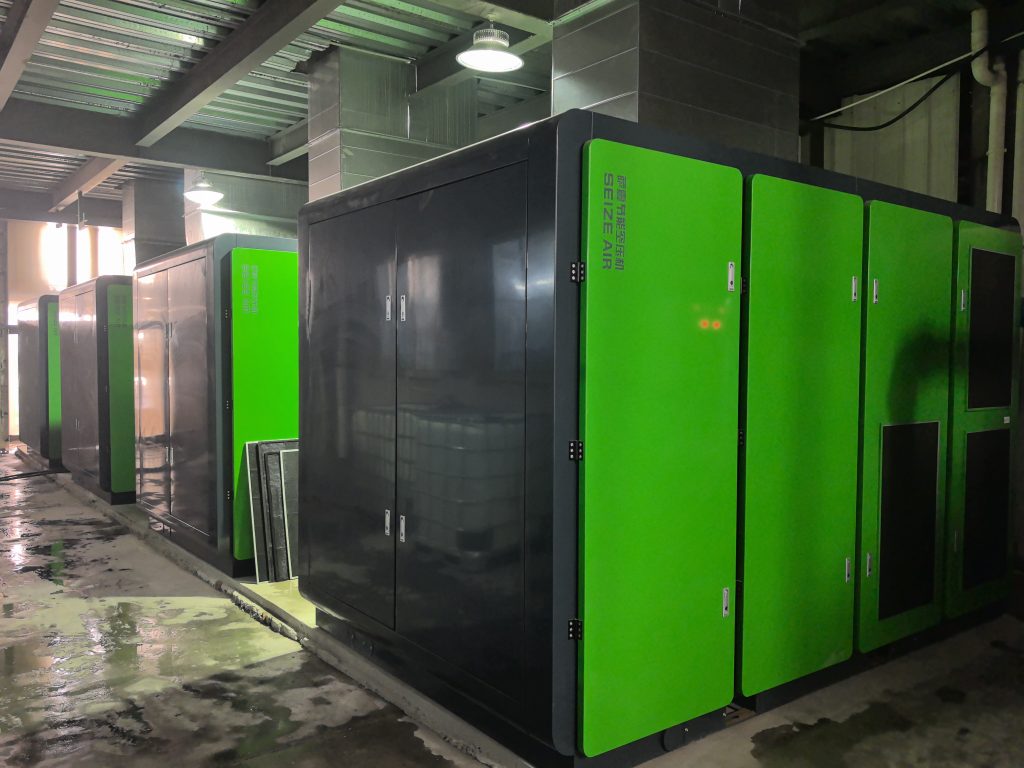
How to Select the Right Energy-Efficient Air Compressor
Define Air Demand and Operating Conditions
First, select a suitable model based on the production line’s air volume and pressure requirements. Oversized or undersized units lead to energy waste or insufficient air supply.
Focus on Energy Efficiency Ratings and Technical Specifications
Select models equipped with Variable Speed Drive (VSD), Permanent Magnet (PM) motors, and intelligent control systems to significantly enhance energy savings.
Consider Operating Environment and Maintenance Convenience
For high-temperature, dusty, or humid environments, choose energy savingcompressors with higher protection ratings and optimized cooling systems. Ensure easy maintenance and adequate spare parts availability.
Prioritize Reputable Brands and After-Sales Support
Energy saving air compressors represent a long-term investment. Prioritize brands with proven technical expertise and service reliability, such as Seize, Atlas Copco, and Ingersoll Rand. These manufacturers possess extensive experience in energy savingtechnologies and system optimization.
Long-Term Benefits of Energy Saving Air Compressors
Implementing energy saving air compressors is not merely an energy conservation measure but a critical step toward industrial modernization. Over the long term, it delivers comprehensive benefits:
Sustained reduction in electricity costs, improving corporate profit margins;
Decreased equipment failures, extending operational lifecycles;
Enhanced corporate energy utilization efficiency, meeting international energy savingstandards;
Laying the foundation for corporate green transformation and carbon neutrality goals.
With rising energy prices and stricter environmental regulations, energy savingcompressors are no longer optional—they represent an inevitable trend in industrial development.
Conclusion
Energy saving air compressors represent the compressed air industry’s shift toward intelligent, low-carbon development. They not only help enterprises optimize energy use and stabilize production but also play a pivotal role in the global wave of industrial green transformation.
Selecting a high-efficiency, reliable energy saving air compressor is not only a rational decision to reduce operational costs but also a crucial step toward sustainable development.
With advanced technology and sustainable performance, Seize energy saving air compressors empower industries to achieve higher efficiency and a greener future.




